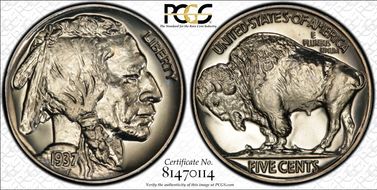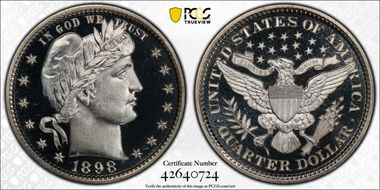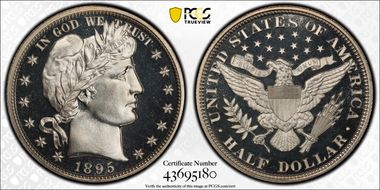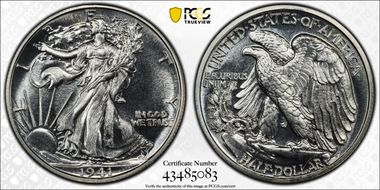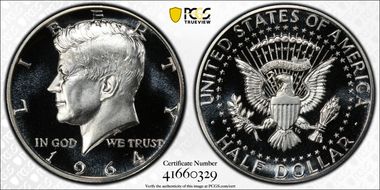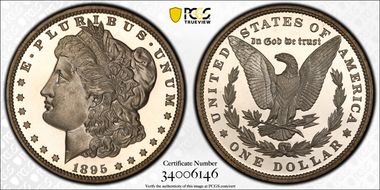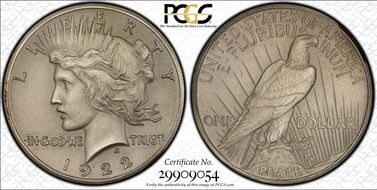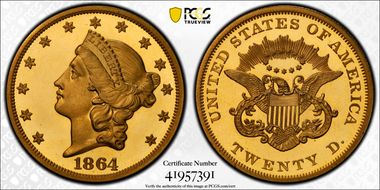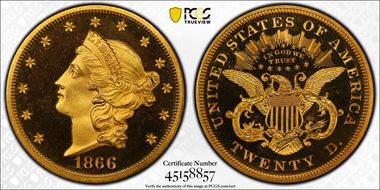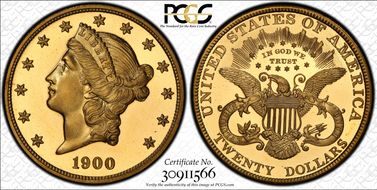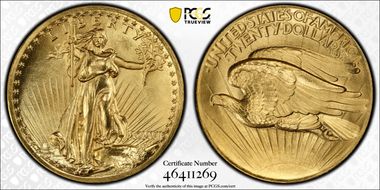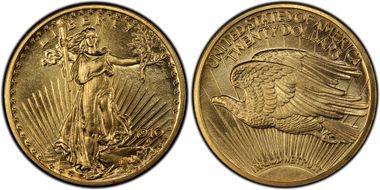Duke Collection Complete U.S. Type Set, Proof 的钱币相册
Ex- Raymond T. Baker, Director of the United States Mint, 1917 to 1922. Owned by Baker from the time it was struck, handed down through his family and friends until being sold in 2014. Bob R. Simpson Collection. Single finest known. CAC Finest known, of 8 graded by PCGS. Mintage perhaps 10-12? The original mintage is unknown- since it was not a regular issue, the Mint did not keep records on the number struck. Undoubtedly very few were made, the coins being intended solely for distribution to influential politicians, Mint and Treasury Department officials, and others intimately involved in the creation and evolution of the Peace dollar design. The coins were not made available to the general public. Per Stacks Bowers auctions: “All Proof 1922 high relief Peace dollars were produced in the same manner, struck… on the Mint's medal press to bring up even the most intricate elements of the design. Once struck the coins were sandblasted in the Mint, this type of finish being popular at the time in production of high quality medallic and coinage works of art. These coins are often referred to as "Matte Proofs," or being of a "matte finish," although they are more accurately described as Sand Blast Proofs in keeping with the method of manufacture.”
James Ten Eyck Collection - John H. Clapp Collection - Louis E. Eliasberg, Sr. Collection - Ed Trompeter Collection. Single finest known Type 1 proof $20 Liberty Head.
Nathan M. Kaufman Collection- Ed Trompeter Collection. Single finest known Type 2 proof $20 Liberty Head. The Type 2 $20 Liberty Head was minted from 1866-1876. This is the single finest known example from the entire series. According to Mint records, only 30 proof Liberty double eagles were struck in 1866. Twenty-five coins were delivered for inclusion in proof sets on January 15, 1866, and five more were delivered on June 8 of that year. The number actually distributed is unknown, but the June striking may indicate that the initial 25 sets had sold out. The design of the double eagle was modified in 1866 to include the motto IN GOD WE TRUST on the reverse. The new reverse motif, known as the Type Two design, may have increased collector-demand for the double eagle in 1866, accounting for the extra coins struck in June. PCGS and NGC have combined to certify only 15 coins, including an unknown number of resubmissions and crossovers. PCGS CoinFacts estimates the surviving population as 14-16 examples in all grades, with two pieces impounded in institutional collections at the Smithsonian Institution and the ANS. About this coin: Nathan M. Kaufman Collection- part of a complete gold gold proof set- sold by Rarcoa 1978 auction, lot 919 for $20,000 The 1986 San Diego Sale, Mid-American Rare Coin Auctions, Sept. 1986, lot 1229 Ed Trompeter Collection, a California industrialist and pioneer in electronic missile tracking (i.e. Patriot Missile System). Following his service as a radioman on the aircraft carrier USS Enterprise during WWII, and subsequent career in television working for the FCC, Mr. Trompeter parlayed his knowledge of radio and television transmissions into his own company specializing in digital electronic connectors used to relay information in television stations, aircraft, telephone systems and the Patriot Missile System. Mr. Trompeter died of cancer in March of 1992 at 73 years of age. He was known for quietly assembling a 600 coin collection over a twenty year period that many consider the world’s finest collection of United States proof gold coins. Auction- 2/25/1992- Part 1- Superior Galleries Trompeter auction of 209 smaller denomination coins, gold dollars through eagles for almost $4 million. Part 2 never happened due to legal issues- both within the family and with the IRS. 1998- Heritage Rare Coin Galleries purchased the remaining gold coins, including this proof $20, from the Trompeter estate for $15.2 million. Heritage spent the next two years selling these coins, with the last being sold at its Philadelphia 2000 sale. 2007- this coin appeared in the Pre-Long Beach Superior Auction, Lot 1096 Fast forward to 2011, in a transaction where Liquid Bullion Coin and Collectibles reported they sold this coin to a private North Texas investor. This coin was most recently housed in an NGC 67 UltraCameo holder until being crossed to PCGS 67 DCAM.
Captain Andrew North Saint-Gaudens Gold Set, possibly from the personal collection of Chief Engraver Charles Edward Barber- Harry W. Bass, Jr. Collection. One of only two High Reliefs designated as Specimens (SP) by PCGS. CAC This coin's proof pedigree traces back to the legendary Captain Andrew North Saint-Gaudens gold set, which, according to the research of Burdette, possibly originated from the personal collection of Chief Engraver, Charles Edward Barber. The set has been heralded as "the rarest set of gold coins in the world," and won the blue ribbon for "Excellency of Exhibit" when it was displayed by Stack's at the 1956 ANA convention in Chicago. It consisted of seven double eagles, including two Ultra High Reliefs, and four eagles, all in simply remarkable condition and encased in a custom-made leather box. The set remained intact, housed in private collections, until NERCG purchased it in April 1980 for $1 million and distributed the pieces to various collectors. The High Relief Wire Edge proof, as well as its proof Flat Edge counterpart, was purchased from NERCG by Harry W. Bass, Jr. at the New York Metropolitan coin show that same month, and remained in that famous collection until Bowers and Merena auctioned it in November 2000.




















